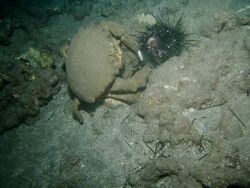Biology:Podotremata
From HandWiki
Short description: Group of crabs
| Podotremata | |
|---|---|

| |
| Dromia dormia (Dromioidea: Dromiidae) feeding on a sea urchin | |
| Scientific classification | |
| Domain: | Eukaryota |
| Kingdom: | Animalia |
| Phylum: | Arthropoda |
| Class: | Malacostraca |
| Order: | Decapoda |
| Suborder: | Pleocyemata |
| Infraorder: | Brachyura |
| Section: | Podotremata Guinot, 1977 |
| Superfamilies | |
|
5; see text | |
Podotremata is a traditionally used section of crabs (Brachyura), now considered to be invalid. It was the smaller grouping of crabs, separate from the larger Eubrachyura section. Morphological and molecular analyses do not reveal a monophyletic Podotremata, but rather that it is paraphyletic, and so the most recent classifications divide "Podotremata" into three sections: Dromiacea, Cyclodorippoidea and Raninoida.[1][2]
This group contains the following superfamilies (with their current sections indicated in parentheses):
- Cyclodorippoidea (Cyclodorippoida)
- Homolodromioidea (Dromiacea)
- Dromioidea (Dromiacea)
- Homoloidea (Dromiacea)
- Raninoidea (Raninoida)
Here is a cladogram showing the placement of the former members of Podetremata (highlighted in bold) within Brachyura:[3][2]
| Brachyura |
| ||||||||||||||||||||||||
References
- ↑ Sammy De Grave et al. (2009). "A classification of living and fossil genera of decapod crustaceans". Raffles Bulletin of Zoology Suppl. 21: 1–109. http://rmbr.nus.edu.sg/rbz/biblio/s21/s21rbz1-109.pdf.
- ↑ 2.0 2.1 Ling Ming Tsang; Christoph D. Schubart; Shane T. Ahyong; Joelle C.Y. Lai; Eugene Y.C. Au; Tin-Yam Chan; Peter K.L. Ng; Ka Hou Chu (2014). "Evolutionary History of True Crabs (Crustacea: Decapoda: Brachyura) and the Origin of Freshwater Crabs". Molecular Biology and Evolution (Oxford University Press) 31 (5): 1173–1187. doi:10.1093/molbev/msu068.
- ↑ Wolfe, Joanna M.; Breinholt, Jesse W.; Crandall, Keith A.; Lemmon, Alan R.; Lemmon, Emily Moriarty; Timm, Laura E.; Siddall, Mark E.; Bracken-Grissom, Heather D. (24 April 2019). "A phylogenomic framework, evolutionary timeline and genomic resources for comparative studies of decapod crustaceans". Proceedings of the Royal Society B 286 (1901). doi:10.1098/rspb.2019.0079. PMID 31014217. PMC 6501934. https://royalsocietypublishing.org/doi/10.1098/rspb.2019.0079.
Wikidata ☰ Q7207081 entry
 |

